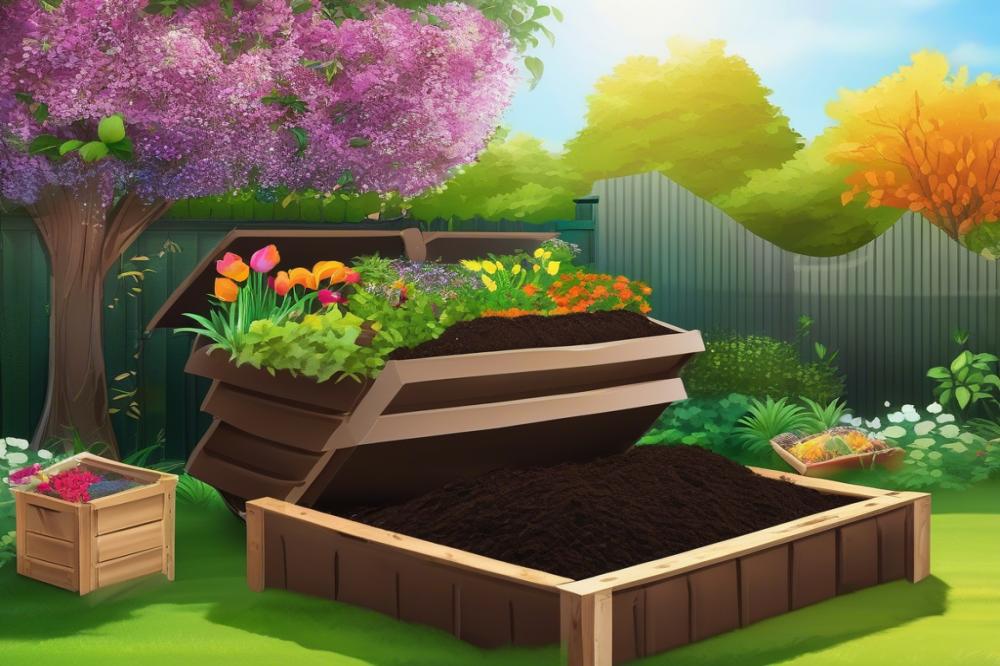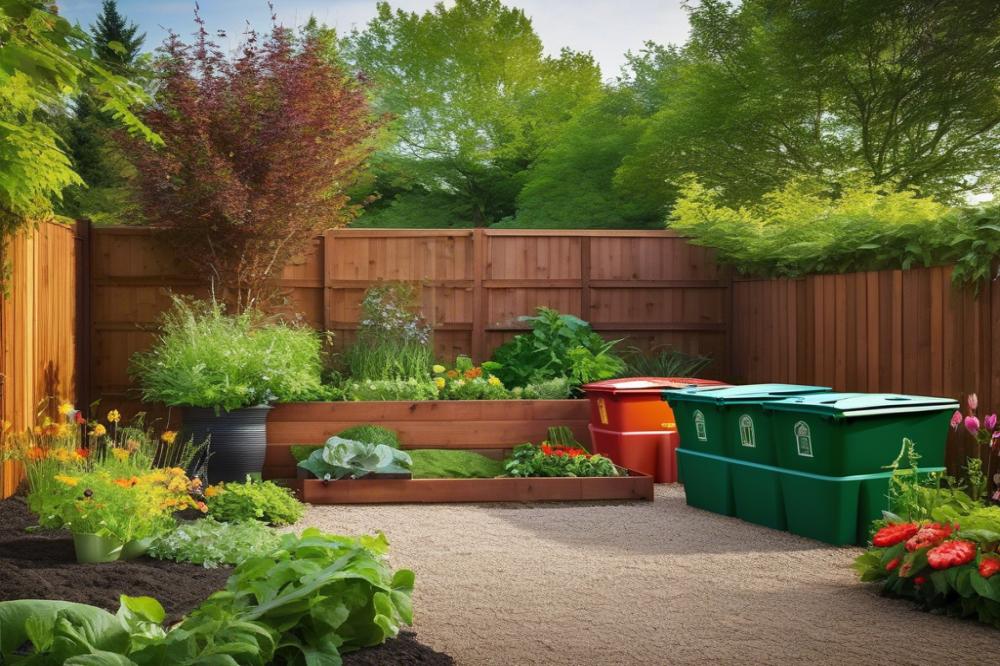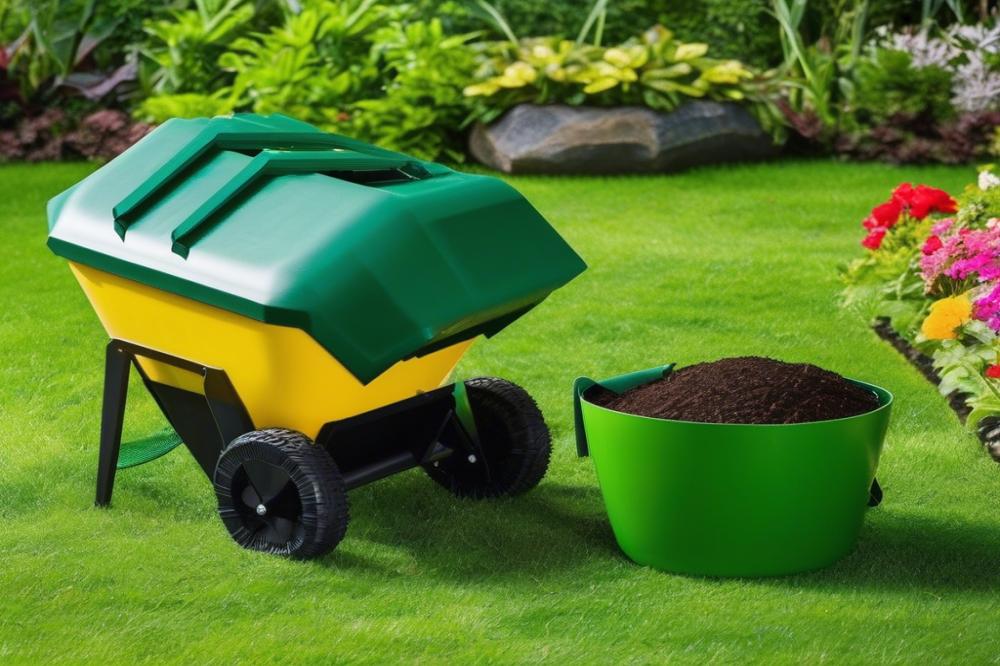Introduction
composting is a simple yet powerful way to turn organic waste into rich, nutritious soil. With the right composting bin and techniques, you can reduce garbage in landfills while creating your own supply of soil enhancer. It’s not only beneficial for your garden but also excellent for the environment. By recycling kitchen scraps and yard waste, you give nature a helping hand.
Having the proper composting bin accessories can take your composting experience to another level. A compost thermometer lets you monitor the temperature of your pile, which is vital for effective decomposition. Keeping a kitchen scraps container close can simplify collecting food waste. This helps in managing food scraps without hassles, ensuring nothing goes to waste.
To further improve your composting process, consider using a compost aerator. This tool helps add air to your compost, promoting better breakdown of materials. A compost turner can also make a difference by mixing the compost, encouraging speedy decomposition. For beginners, a comprehensive composting guide offers invaluable insights into what works best.
Using compostable bags can tidy up the process of collecting organic waste. These bags help transport food scraps and yard debris without harming the environment. Think about adding mulch to your garden, as this acts as a protective cover while retaining moisture.
Investing in the right composting tools and accessories is essential for successful composting. With proper care and the right approach, you can transform organic waste into valuable compost. Remember, better tools lead to improved results. Start your composting journey today!
Understanding composting bin accessories
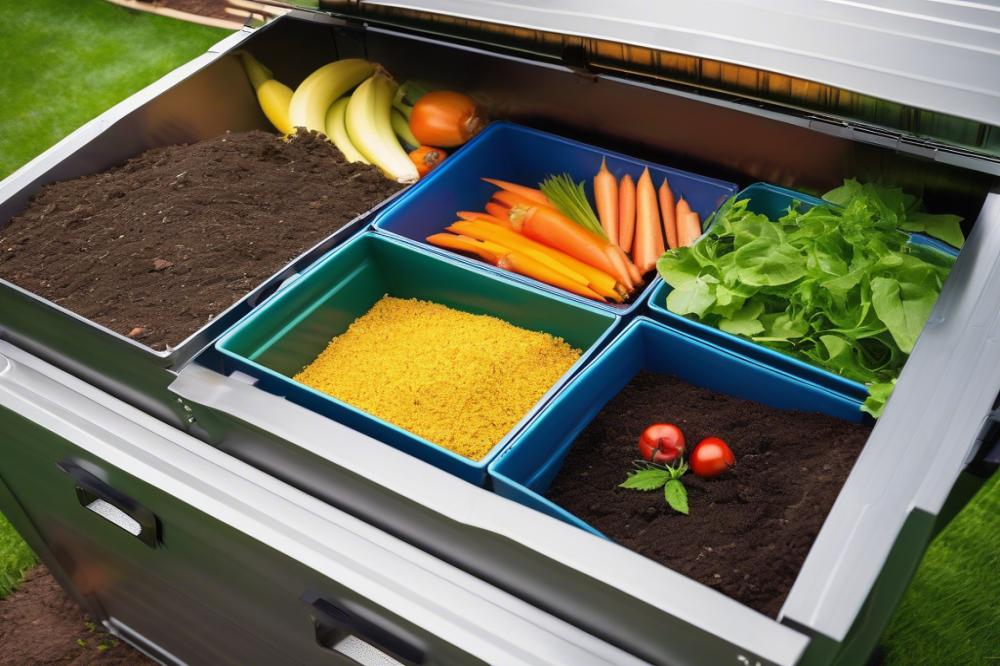

Composting bin accessories are tools and items that help make composting easier and faster. They include everything from containers for kitchen scraps to thermometers that check the temperature inside the compost bin. Each accessory adds benefits that can enhance the composting process.
A compost thermometer is a vital tool for monitoring your compost’s temperature. When the temperature is right, bacteria break down organic waste effectively. This means you get rich compost sooner and with less hassle.
A kitchen scraps container keeps your food waste tidy until you’re ready to compost. It prevents unpleasant odors and attracts fewer pests. Using compostable bags in this container makes it simple to transfer waste to the main bin without spilling.
A compost aerator is another useful accessory. By regularly aerating your compost, you introduce oxygen. This promotes beneficial microbes and speeds up decomposition, which can be a game-changer for your composting efforts.
Every gardener should have a composting guide nearby. It provides tips and best practices for maintaining a healthy compost pile. Learning about the right balance of materials will lead to better compost quality.
When you’re dealing with your finished compost, mulch is essential. Applying it around plants improves soil health and keeps moisture in. This small step can make a big difference in your garden’s success.
To mix your compost efficiently, a compost turner is recommended. This tool helps distribute materials evenly. It makes sure that everything breaks down at a similar rate, promoting uniform composting.
Lastly, a compost filter can be a handy accessory. It reduces odors while allowing air to flow. This is especially useful for those who live near neighbors or who keep their compost bins close to their homes.
Essential Accessories for Effective Composting
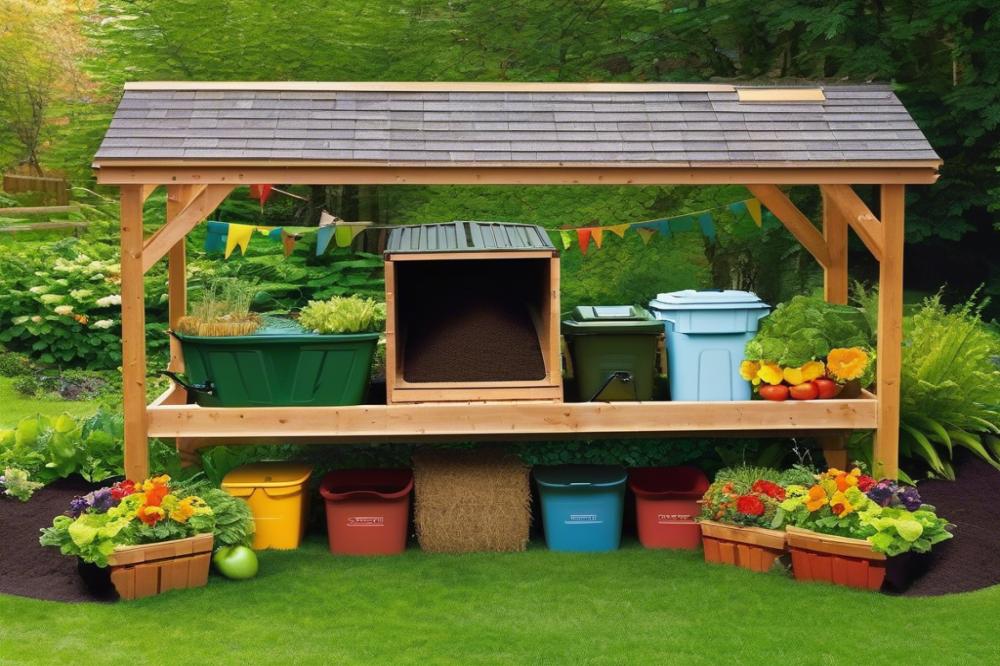

A compost thermometer is a must-have for any serious compost enthusiast. Monitoring temperature plays a key role in the decomposition process. By measuring the internal heat of your compost bin, you can determine if the conditions are right for efficient breakdown. Optimum temperatures encourage the right microbes to thrive and break down organic materials quickly.
Next, consider investing in a kitchen scraps container. This handy accessory simplifies collecting organic waste from your kitchen. It keeps everything organized and allows for easy transport to your compost bin. Choose one with a lid to control odors and keep pests away. This small step makes a bigger impact than you might expect.
Compostable bags serve a vital purpose in managing kitchen scraps. These eco-friendly alternatives to plastic help keep your composting area clean. Simply toss your organic waste into the bag and let it break down naturally. They decompose along with your kitchen scraps, minimizing waste while being better for the environment. There’s no guilt in throwing them away, unlike traditional plastic bags.
Don’t forget about a compost aerator. This tool is essential for mixing and aerating your compost. Proper aeration introduces oxygen, which aids in decomposition. Regularly turning your pile leads to faster results and more robust compost. A compost turner can also be quite useful here.
A composting guide can enhance your composting journey. With tips and tricks for balancing greens and browns, it can be a valuable resource for novices and experts alike. It often includes specific advice about materials like mulch, ensuring you create the ideal mix for nutrient-rich compost.
Lastly, consider using a compost filter for reducing odors in your compost bin. It traps unpleasant smells and keeps the composting process pleasant. This small investment makes all the difference, especially for indoor composting.
Tools for Aeration and Mixing
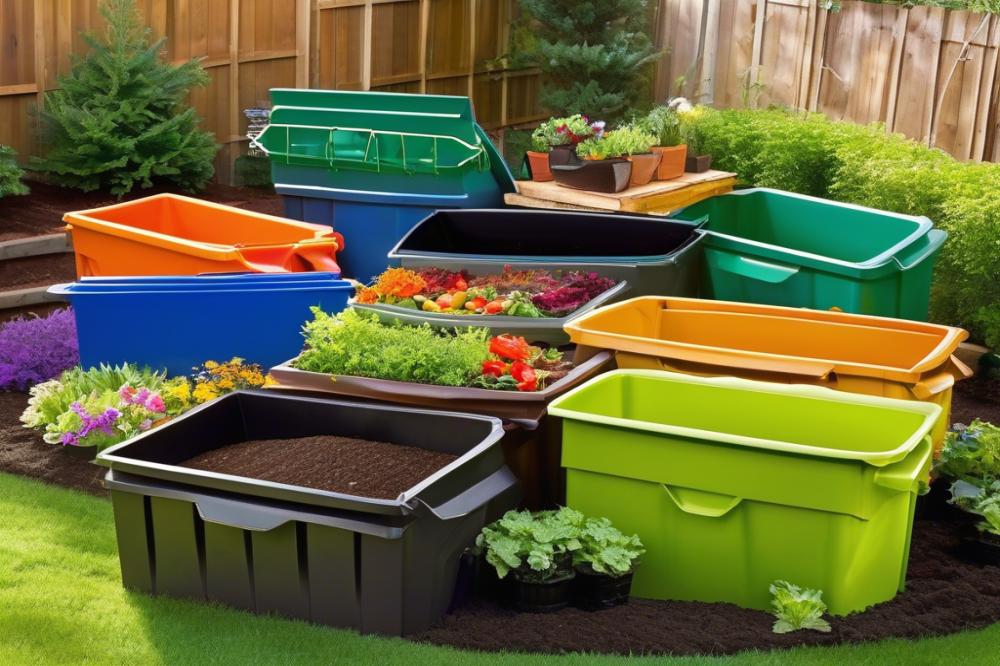

Compost Aerator: Benefits of Oxygen in Composting
Using a compost aerator can transform your composting experience. This handy tool allows air to flow freely through your organic waste. Oxygen is crucial for the composting process. Aerobic bacteria thrive when there’s plenty of oxygen, breaking down materials more efficiently. As a result, you’ll notice faster decomposition and richer compost. Balancing moisture is also vital, so a compost aerator helps prevent your pile from getting too soggy. It’s easy to use, and you’ll be amazed at how much better your composting results can be.
Compost Turner: Importance of Turning the Compost Regularly
Regularly turning your compost is essential for promoting even decomposition. Using a compost turner makes this task much simpler. This tool mixes the materials, ensuring that everything breaks down at a consistent rate. Aerating the pile while turning helps in maintaining the right warmth, which is key for breakdown. It also aids in releasing any unpleasant odors that may arise. By turning the compost, you allow different materials to experience the heat necessary for decomposition. A versatile compost turner can make this process smooth, leaving you with high-quality mulch in no time. Don’t overlook the importance of mixing and aeration – it’s the secret to successful composting!
Managing Moisture and Odors
Proper moisture levels are vital for successful composting. A compost filter is a crucial accessory that can help reduce odors. By allowing air to flow through, it prevents smells from becoming overwhelming. Without airflow, your compost bin may attract unwanted pests. Nobody wants a swarm of flies hovering around their organic waste, right?
When it comes to moisture, aim for a range of 40% to 60%. If your compost is too wet, it can become anaerobic, leading to unpleasant odors. Check moisture using a compost thermometer. This tool is handy, allowing you to gauge the internal environment of the bin. Adding mulch can assist in controlling moisture levels. It helps retain water when the environment is dry while absorbing excess moisture when it rains.
A kitchen scraps container makes it easy to collect organic materials. Always use compostable bags for disposal. They break down naturally, contributing to healthy compost. For aerating, consider adding a compost aerator to your toolkit. This tool lets you mix the materials without making a mess.
On occasion, a compost turner can be beneficial as well. It helps you distribute moisture evenly throughout the pile. Maintaining the right balance of carbon and nitrogen is also essential for optimum composting performance. Be sure to reference your composting guide for ideal ratios.
Regular monitoring is important. Analyzing the smell of your compost can give you clues. A fresh earth scent indicates a healthy mix. If an unpleasant odor arises, it might signal that the compost is either too wet or lacking sufficient airflow. Managing these factors will set you up for success.
Additional Accessories for Efficiency
Using finished compost as mulch is a fantastic idea. This practice helps retain moisture in the soil while suppressing weeds. By laying down a layer of mulch, you protect your garden from harsh weather conditions. It also enhances the nutrients available to the plants as it breaks down further over time.
A composting guide can be a valuable resource for both beginners and advanced composters alike. Whether you’re just starting or looking to refine your techniques, a good guide offers tips and tricks. This can include information about layering organic waste, using compostable bags, or the best ways to use a compost aerator. Investing in a clear guide saves time and makes the process much easier.
If you want to monitor the temperature of your compost pile, a compost thermometer is essential. Maintaining the right heat levels speeds up the decomposition process. Knowing the right temperature helps you adjust the pile for optimal results. Together with a kitchen scraps container, this thermometer makes managing your compost system efficient.
Another must-have is a compost turner. This tool aerates the pile, promoting even decomposition. Without proper air circulation, the composting process can slow down. It’s an easy way to keep things moving along, ensuring your homemade compost is ready for your garden sooner.
Don’t overlook the importance of a compost filter. This accessory can help minimize odors and prevent pests from becoming a problem. A clean and odor-free compost bin is more appealing and easier to manage. Being proactive with these tools can lead to a healthier composting experience.
Ready to dive deeper into your composting journey? A wide array of resources is available to enhance your knowledge. As you gain experience, consider experimenting with different methods outlined in various composting guides. With the right accessories and a bit of patience, transforming kitchen scraps into rich compost can be a straightforward and rewarding process.
Tips for Getting Started
How to Choose the Right Composting Bin
Selecting a compost bin can feel overwhelming, but it doesn’t have to be. Consider the space you have available. Many options fit various needs, from small kitchen scraps containers to larger outdoor bins. Look for one that fits your yard size and composting goals. Make sure it allows for proper ventilation. This is crucial for encouraging the breakdown of organic waste. Some bins come equipped with features that enhance airflow. Additionally, check if the bin has a secure lid to keep pests away.
Setting Up Your Composting Area
A well-planned composting area can make a big difference. Choose a spot that’s easily accessible. Placing it close to your kitchen aids in using compostable bags for kitchen waste. A shady location can help control moisture levels. Lay a few inches of mulch on the ground before placing your bin. This can help keep moisture in and improve drainage. You might want to have a compost thermometer nearby. It helps monitor the temperature of your compost pile, indicating when it’s ready to be turned.
Maintaining Your Compost Pile
Keeping the compost pile active requires some effort. Turn your compost regularly using a compost turner. This promotes airflow and speeds up decomposition. Adding materials like shredded newspaper or grass clippings helps balance the green and brown layers. Make sure it stays moist but not soggy. A good composting guide can offer further insights into ratios and materials. As your compost breaks down, you may need to sift with a compost filter to remove larger chunks. Soon enough, you’ll have rich compost ready for use in your garden!
Wrapping it Up
Composting is an essential process that helps our environment. Accessories for your bin play a crucial role in making this process successful. Tools like a compost thermometer can help you monitor the internal temperature, which is vital for the decomposition of organic materials. A kitchen scraps container also makes it easy to collect food waste. Keeping things organized and effective will lead to richer compost.
Starting your composting journey may seem daunting, but it doesn’t have to be. With the right accessories, you can simplify the process. Invest in items that match your composting goals. Each tool improves efficiency and enhances the quality of your compost.
Many people enjoy the satisfaction of recycling waste into something valuable. Don’t hesitate to join the ranks of eco-friendly enthusiasts. Take the first step and gather the supplies you need. Soon, you’ll see how rewarding it is to nurture your little ecosystem. Begin composting today and witness the transformation that occurs. You’ll not only benefit your garden, but you will also contribute to a healthier planet.

